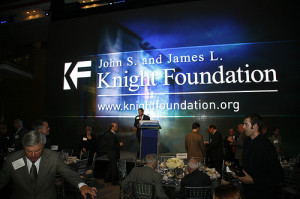 The 2010 Knight News Challenge winners were announced last week at the Future of News and Civic Media Conference, held at MIT. The John S. and James L. Knight Foundation selected 12 winners from nearly 2,500 entries from across the world and awarded them grants totaling $2.74 million.
The 2010 Knight News Challenge winners were announced last week at the Future of News and Civic Media Conference, held at MIT. The John S. and James L. Knight Foundation selected 12 winners from nearly 2,500 entries from across the world and awarded them grants totaling $2.74 million.
Some of the more interesting winning ideas include:
- Local Wiki – Philip Neustrom and Mike Ivanov of DavisWiki.org received a $350,000 grant to create enhanced tools for local wikis. Wiki websites use software that allow easy creation and editing of pages, often for collaborative efforts, such as WikiPedia. Neustrom and Ivanov hope to encourage local communities to maintain their own wikis.
- WindyCitizen’s Real Time Ads — Brad Flora received a $250,000 grant to develop a software interface for real-time ads that will show the most recent message from the advertiser’s social networking profile of choice.
- Order in the Court 2.0 — John Davidow received a $250,000 grant to create a Boston courtroom-based laboratory to improve digital coverage of judicial proceedings. About the project, Davidow writes, “While the legislative and executive branches have incorporated new technologies and social media, the courts still operate under the video and audio recording standards established in the 1970s and ’80s. The courtroom will have a designated area for live blogging via a Wi-Fi network and the ability to live-stream court proceedings to the public. Working in conjunction with the Massachusetts court system, the project will publish the daily docket on the Web and build a knowledge wiki for the public with common legal terms.”
- One-Eight — Teru Kuwayama received a $202,000 grant to develop a project that chronicles U.S. military operations in Afghanistan through the experiences of one batallion.
- Stroome — Nonny de la Peña and Tom Grasty received a $200,000 grant to create a virtual studio that would eliminate the need for video editors to rely on expensive satellite truck technology.
The rules for the News Challenge are that the projects must use digital, open-source technology; distribute news in the public interest; and the projects must be tested in a local community. Many of this year’s winning project ideas focus on hyperlocal activities as the final outcome, like Local Wiki mentioned above. About the local focus of his project, Neustrom said:
It’s an effort to create a new form of local media around mass collaboration. When we think about local blogs and how successful they’ve become and how common they are, and when we think about local media and what the future form of that might be, it might make a sense to picture a way where everyone in the community can contribute to one cohesive unified thing.
Neustrom also said that one of the biggest obstacles to the growth of such an idea has been the learning curve of working with current wiki software. He and his partner Ivanov want to simplify that software. Local Wiki also involves plans to include map technology, which is also a component of several other New Challenge winners’ projects.
The Knight Foundation has been awarding these grants since 2007. We wrote about the progress of a winning idea from 2008, the Sochi Olympics Project, a few months ago on the SixEstate blog. Another site we’ve covered here before, whistleblower website WikiLeaks, submitted a proposal for the New Challenge but was rejected. Marc Fest, a spokesman for the Knight Foundation, wouldn’t comment on rejected proposals but when asked specifically about WikiLeaks, he had pointed to the three rules listed above.
Applications for the fifth and final year of the News Challenge grants will open in the Fall.
Source: “Announcing the 2010 Knight News Challenge winners: Visuals are hot, and businesses are big winners,” The Nielsen Journalism Lab blog, 06/16/10
Source: “Knight News Challenge: Is a wiki site coming to your city? Local Wiki will build software to make it simple,” The Nielsen Journalism Lab blog, 06/18/10
Source: “Knight Foundation Hands Out Grants to 12 Groups, but Not WikiLeaks,” The New York Times‘ Media Decoder blog, 06/17/10
Image by The Knight Foundation, used under its Creative Commons license.